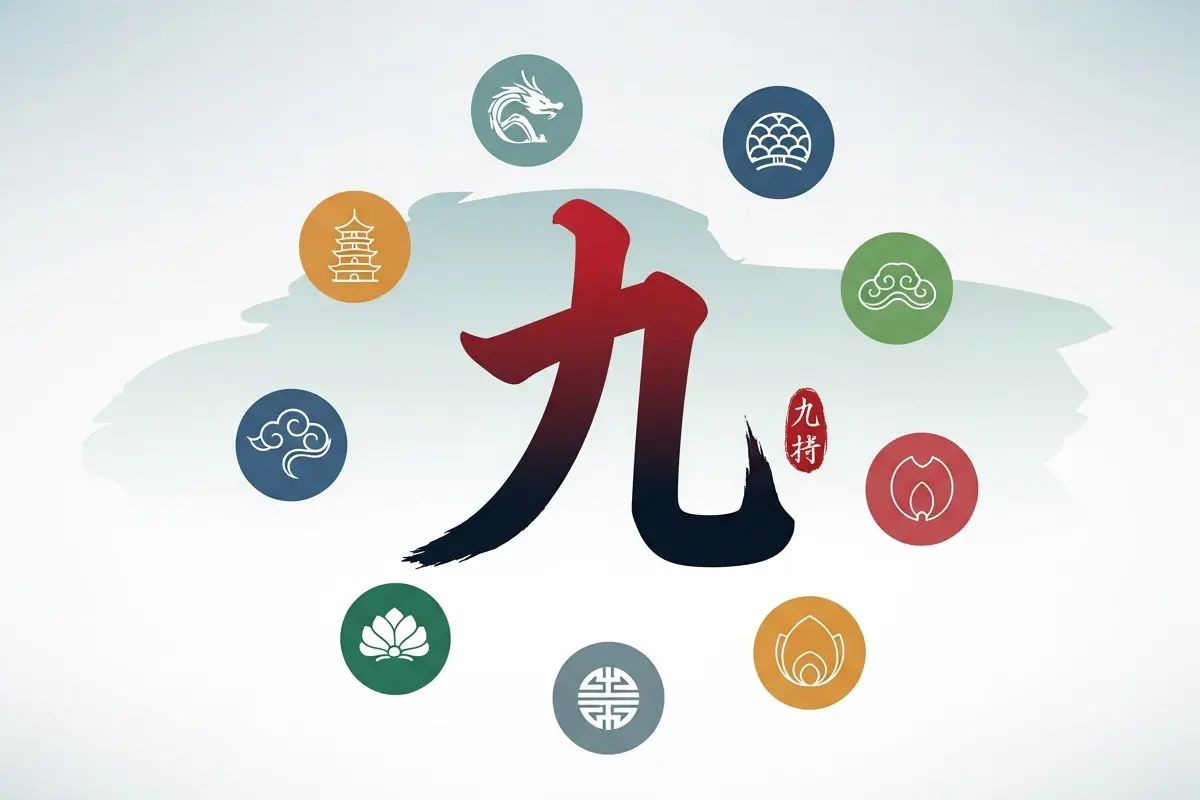
TL;DR
- 9 in Chinese is 九 (jiǔ)
— pronounced “jee-yo” with a rising tone (third tone). - The number symbolizes longevity, eternity, completeness, and imperial power in Chinese culture.
- 九 appears in traditions like the Double Ninth Festival (重阳节) and nine-dragon symbolism in ancient architecture.
- It is always written as 九, no simplified/traditional variation.
- Usage is common in daily life, lucky numbers, idioms, and names.
What Does “9 in Chinese” Mean?
9 in Chinese is written as 九 and pronounced jiǔ.
It carries cultural symbolism linked to long life, completeness, and lasting relationships. Historically, the number nine was considered the highest single digit and often associated with emperors and heaven.
In modern Mandarin, 九 appears frequently in dates, prices, slang, and traditional celebrations like the Double Ninth Festival, recognized by cultural institutions such as the Chinese National Museum (中国国家博物馆).
How to Say 9 in Chinese
| Chinese Character | Pinyin | Tone | Meaning |
|---|---|---|---|
| 九 | jiǔ | Third tone (ˇ) | the number 9 |
Pronunciation tip:
The third tone starts mid, dips down, then rises.
Think of saying “jee-yo” but with a dip in the middle.
For deeper tone practice, you can review tone rules explained in:
Pinyin Tone Marks Explained
How to Write the Chinese Character 九
九 is simple — only two strokes.
Stroke Order
- A short diagonal downward-left stroke (撇)
- A longer curved downward-right stroke (横折钩)
Although 九 has no simplified/traditional differences, its shape is ancient. According to the Chinese Etymology Database at Academia Sinica, 九 evolved from oracle bone inscriptions depicting a bent object — later stylized into its current form.
If you’re learning characters systematically, the spaced-repetition strategies in
How to Memorize Chinese Characters Effectively
are especially helpful for beginners.
Cultural Meaning of 9 in Chinese
1. Longevity & Long Life
Nine is a symbol of eternity because the word jiǔ (九) sounds like 久, meaning “long-lasting.”
This auspicious connection appears often in literature, blessings, and classical poetry referenced in sources such as the Chinese Text Project
2. Imperial Power
Ancient Chinese emperors reserved the number nine for themselves:
- 9 rows of nails on imperial gates
- 9 mythical dragons
- 9 ranks of officials
According to the Palace Museum in Beijing, the Hall of Supreme Harmony features arrangements based on multiples of nine.
3. Double Ninth Festival (重阳节)
Celebrated on the 9th day of the 9th lunar month, this festival honors:
- family
- elders
- longevity
- mountain climbing traditions
The festival is officially recognized under China’s cultural heritage listings by the Ministry of Culture and Tourism.
4. Lucky Number in Modern Life
Nine appears in:
- phone numbers
- license plates
- wedding dates
- pricing (¥9.99 for marketing psychology)
- branding and product names
It remains a highly valued number among Chinese-speaking communities globally.
How to Use 九 in Daily Mandarin
Everyday Examples
- 九点 — 9 o’clock
- 九号 — the 9th day of the month
- 九块九 — ¥9.9 (common marketing price)
- 九个人 — nine people
- 九年 — nine years
Idioms Using 九
| Idiom | Pinyin | Meaning |
|---|---|---|
| 九牛一毛 | jiǔ niú yì máo | “one hair among nine oxen,” meaning something insignificant |
| 长长久久 | cháng cháng jiǔ jiǔ | forever, lasting a long time |
| 九死一生 | jiǔ sǐ yī shēng | extremely dangerous, “nine deaths, one life” |
If you’re new to Mandarin rhythm and structure, you may like
Mandarin vs Chinese Language: Key Differences Explained
for context on how numbers fit into speech patterns.
Why Is 9 Considered Lucky in Chinese Culture?
Because it sounds like 久 (long-lasting)
This makes it a popular number for:
- weddings
- business names
- romantic anniversaries
- longevity blessings for elders
Because it is the largest single digit
Classical numerology links nine to heaven (天) and unity.
You can observe this in imperial sites such as:
- The Nine-Dragon Wall in the Forbidden City
- The Nine-Dragon Screen in Datong
- “九重天” (the Ninth Heaven) in Daoist tradition
These cultural references are documented within the Palace Museum’s architectural research archives.
Quick Comparison Table
| Number | Chinese | Pinyin | Notes |
|---|---|---|---|
| 6 | 六 | liù | very lucky (smooth progress) |
| 8 | 八 | bā | extremely lucky (prosperity) |
| 9 | 九 | jiǔ | longevity, completeness, imperial symbolism |
| 4 | 四 | sì | unlucky homophone with “death” |
FAQ
What is 9 in Chinese?
The number 9 is written as 九 and pronounced jiǔ.
Is 9 a lucky number in China?
Yes. It symbolizes longevity, completeness, and traditional imperial power.
Is 9 used in Chinese festivals?
Yes. The Double Ninth Festival (重阳节) occurs on the 9th day of the 9th lunar month.
Is 九 used in Simplified and Traditional Chinese?
Yes, 九 is identical in both writing systems.
How do you pronounce 九 correctly?
Use the third tone (dipping tone): jiǔ.